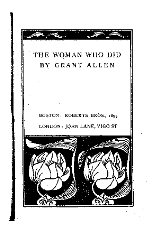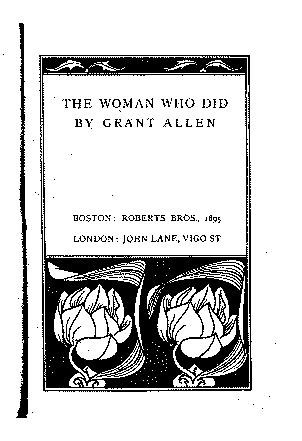
The Woman Who Did
Encyclopedia

Grant Allen
Charles Grant Blairfindie Allen was a science writer, author and novelist, and a successful upholder of the theory of evolution.-Biography:...
about a young, self-assured middle-class
Bourgeoisie
In sociology and political science, bourgeoisie describes a range of groups across history. In the Western world, between the late 18th century and the present day, the bourgeoisie is a social class "characterized by their ownership of capital and their related culture." A member of the...
woman who defies convention as a matter of principle and who is fully prepared to suffer the consequences of her actions. It was first published in London
London
London is the capital city of :England and the :United Kingdom, the largest metropolitan area in the United Kingdom, and the largest urban zone in the European Union by most measures. Located on the River Thames, London has been a major settlement for two millennia, its history going back to its...
by John Lane
John Lane (publisher)
-Biography:Originally from Devon, where he was born into a farming family, Lane moved to London already in his teens. While working as a clerk at the Railway Clearing House, he acquired knowledge as an autodidact....
in a series intended to promote the ideal of the "New Woman
New Woman
The New Woman was a feminist ideal that emerged in the late 19th century. The New Woman pushed the limits set by male-dominated society, especially as modeled in the plays of Norwegian Henrik Ibsen . "The New Woman sprang fully armed from Ibsen's brain," according to a joke by Max Beerbohm...
". It was adapted into a silent film The Woman Who Did
The Woman Who Did (film)
The Woman Who Did is a 1915 British silent drama film directed by Walter West and starring Eve Balfour, Thomas H. MacDonald and George Foley. It was adapted from the 1895 novel The Woman Who Did by Grant Allen. It follows the life of Herminia Barton, a Cambridge-educated woman as she tries to make...
directed by Walter West
Walter West (director)
Walter West was a British film director. He was a partner in the film production company Broadwest Films.-Broadwest:...
in 1915.
Plot summary
Herminia Barton, the CambridgeUniversity of Cambridge
The University of Cambridge is a public research university located in Cambridge, United Kingdom. It is the second-oldest university in both the United Kingdom and the English-speaking world , and the seventh-oldest globally...
-educated daughter of a clergyman, frees herself from her parents' influence, moves to London
London
London is the capital city of :England and the :United Kingdom, the largest metropolitan area in the United Kingdom, and the largest urban zone in the European Union by most measures. Located on the River Thames, London has been a major settlement for two millennia, its history going back to its...
and starts living alone. As she is not a woman of independent means, she starts working as a teacher. When she meets and falls in love with Alan Merrick, a lawyer, she suggests they live together without getting married. Reluctantly, he agrees, and the couple move to Italy
Italy
Italy , officially the Italian Republic languages]] under the European Charter for Regional or Minority Languages. In each of these, Italy's official name is as follows:;;;;;;;;), is a unitary parliamentary republic in South-Central Europe. To the north it borders France, Switzerland, Austria and...
. There, in Florence
Florence
Florence is the capital city of the Italian region of Tuscany and of the province of Florence. It is the most populous city in Tuscany, with approximately 370,000 inhabitants, expanding to over 1.5 million in the metropolitan area....
, Merrick dies of typhoid before their daughter Dolores is born. Legal technicalities and the fact that the couple were not married prevent Herminia from inheriting any of Merrick's money.
Dreaming of being a role model for Dolores and her friends, Herminia returns to England and raises her daughter as a single mother. She wants to show the younger generation that even as a woman there is something one can do about the unfair position of women in society—a small step maybe, but with more and larger steps to follow soon. However, Dolores turns out to be ashamed of her mother's unmarried state and gradually turns against her. Eventually, Herminia chooses to make a huge sacrifice for her daughter's benefit and commits suicide
Suicide
Suicide is the act of intentionally causing one's own death. Suicide is often committed out of despair or attributed to some underlying mental disorder, such as depression, bipolar disorder, schizophrenia, alcoholism, or drug abuse...
.
Whereas Herminia Barton questions the institution of marriage
Marriage
Marriage is a social union or legal contract between people that creates kinship. It is an institution in which interpersonal relationships, usually intimate and sexual, are acknowledged in a variety of ways, depending on the culture or subculture in which it is found...
by refusing to get married herself, Victoria Crosse's heroine Eurydice Williamson -- "the woman who didn't" -- remains faithful to her impossible husband although, during a passage from India
India
India , officially the Republic of India , is a country in South Asia. It is the seventh-largest country by geographical area, the second-most populous country with over 1.2 billion people, and the most populous democracy in the world...
, she meets a man who falls in love with her.
Reception
Allen was sympathetic to the feministFeminism
Feminism is a collection of movements aimed at defining, establishing, and defending equal political, economic, and social rights and equal opportunities for women. Its concepts overlap with those of women's rights...
cause and saw his novel as a means to propagate women's rights. However, the novel was controversial right from the start, with conservative readers as well as feminists criticizing Allen for the heroine he had invented. For example, Victoria Crosse
Annie Sophie Cory
Annie Sophie Cory was the author of popular, racy, exotic novels under the pseudonyms Victoria Cross, Vivian Cory and V.C. Griffin.-Life:...
wrote her novel The Woman Who Didn't (1895) as a response to Allen's book.
Another novel written in reply to Allen's work, Lucas Cleeve
Lucas Cleeve
Lucas Cleeve was a novelist born in England, the author of over sixty works including The Woman Who Wouldn't in 1895. Most of her novels were published under the pseudonym of Mrs Howard Kingscote.-Life:...
's The Woman Who Wouldn't, (1895) sold well and received hostile reviews, she said of this,
"If one young girl is kept from a loveless, mistaken marriage, if one frivolous nature is checked in her career of flirtation by remembrance of Lady Morris, I shall perhaps be forgiven by the public for raising my feeble voice in answer to the The Woman Who Did,"
External links
- The full text of The Woman Who Did online
- "The Woman Who Wouldn't Do", a parodyParodyA parody , in current usage, is an imitative work created to mock, comment on, or trivialise an original work, its subject, author, style, or some other target, by means of humorous, satiric or ironic imitation...
first published in Punch No.108 (March 30, 1895) 153. - Free MP3 audiobook of The Woman Who Did from LibriVox
- Note: "She-Note Series" is an allusion to John Lane's "Keynote Series" in which The Woman Who Did was published.

